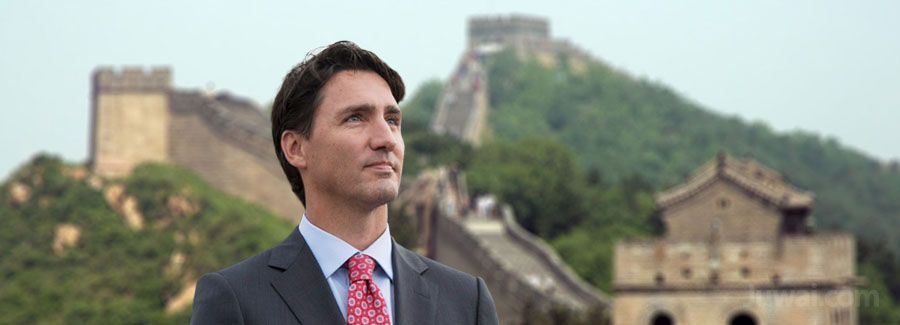亚洲新闻
- 主页
- 新闻
- 亚洲新闻
You've successfully copied this link.
Justin Trudeau: 4 key takeaways from his China visit

Justin Trudeau’s first official state visit to China1 looks set to rekindle the China love affair with Canada.
Echoing his father’s footsteps – former Canadian Prime Minister Pierre Elliott Trudeau, who has been the object of Chinese praise during his time – Trudeau’s 8-day visit has been a smashing success so far.
From being admired by Alibaba founder Jack Ma2 to being a social media sensation with the Chinese public, who have affectionately bestowed Trudeau with the nickname ‘Xiao Tudou’ – which translates to ‘Little Potato’ in Mandarin, and is a play on his surname3 – his visit to China has definitely made Chinese sit up and take notice.
The Canadian Prime Minister’s visit follows a period where the influence of Chinese property buyers on Canada’s real estate markets has hit the headlines, resulting in a 15% foreign buyer tax in British Columbia to cool sales volumes and price growth.
Nevertheless, demand from Chinese buyers in Canada remains robust despite the policy changes, with Juwai Data showing that Chinese buyers are dealing with the new foreign buyer tax by turning their attention towards other cities in Canada.
Chinese buyer enquiries for Alberta properties alone surged 70% y-o-y on Juwai.com in Q1 2016.
4 ways Trudeau’s visit will bolster China-Canada ties
Looking at the outcomes of Prime Minister Justin Trudeau’s visit to China, there are plenty of reasons to expect that the ‘Trudeau Effect’4 will forge a much closer relationship between the two countries in the coming years.
What this means, in other words, is that we can expect this renewed ‘friendship’ to bolster a continued flow of enquiries from China for Canadian properties. Here are four reasons why:
#1 Larger profile for Canada in China
Whether for his good looks, brains, or stellar political reputation, Trudeau is one of the world’s most talked-about leaders.
Having garnered photo shoots in Vogue5, profiles in Vanity Fair6, and public declarations of breathless admiration from Chinese on social media and press, his presence in China – cannily covered on his very own WeChat and Weibo and channels7, 8 – has raised both his and Canada’s profile in China like never before.
#2 Closer trade and investment links
Trudeau’s visit this time is clearly economic-focused. In a meeting with Chinese Premier Li Keqiang, Trudeau proposed the two governments work on a free-trade deal9 between the two countries, a move which – if completed – will solidify stronger business ties and promote greater trade, investment and movement between the two countries.
Beyond Trudeau’s announcement of Canada’s intention to join China’s Asian Infrastructure Investment Bank (AIIB)2, the Canadian government also announced that 56 deals worth over $1.2 billion have been signed at a ceremony held at the Canadian China Business Council on Thursday.10
#3 Enhanced visa processing
Chinese arrivals in Canada for H1 2016 were up 24% y-o-y11, proving that Canada is proving more popular than ever with Chinese travellers – and Canada knows this.
Keen to attract more Chinese visitors, the Canadian government announced in tandem with Trudeau’s visit that seven more visa offices will be opened throughout China to cater to demand for travel and emigration to Canada.11
In fact, with China in mind, Canada is looking to launch a new immigration investment visa programme for HNWIs to increase the flow of capital and expertise into the economy.12
#4 Improved transport connectivity
The fast-growing flow of Chinese tourists and the closer trading and investment relationship heralded by Trudeau’s trip is driving new transport links between China and Canada.
Beijing Capital Airlines announced a new route between Hangzhou and Vancouver13, while China Southern Airlines added a link between Guangzhou and Toronto14, which followed Air China’s introduction of a Beijing to Montreal link in late 2015.15
In all, Prime Minister Justin Trudeau’s visit to China may have been a short trip, but one with a big impact. Coupled with Canada’s existing appeal for Chinese buyers – driven by excellent education options, attractive lifestyle standards, reputation for safety – it’s safe to say that Canada will likely remain an appealing investment hotspot for Chinese property buyers.
Sources: 1. Canada: Prime Minister’s Office: Official China trip announcement; 2. The Globe and Mail: China’s press, social media rave about ‘handsome’ Trudeau; 3. The Washington Post: In his father’s footsteps, Justin Trudeau is looking to be big in China; 4. The Star: ‘Trudeau effect’ restores trust in business, media: report; 5. Vogue: Justin Trudeau Is the new young face of Canadian politics; 6. Vanity Fair: The scion also rises; 7. CBC News: Justin Trudeau turns to Weibo and WeChat to reach Chinese audience; 8. Justin Trudeau’s Weibo page; 9. Global News Canada: Trudeau opens Canada’s door wider to China; 10. CBC News: China, Canada firms sign 56 deals worth more than $1.2B; 11. CBC News: Canada to announce the opening of 7 new visa offices in China; 12. Investment Immigration Canada: Federal government considering new investment immigration program (Audio); 13. YVR lands new carrier: Beijing Capital Airlines; 14. China Aviation Daily: China Southern postpones Toronto service to December; 15. Chinese Embassy in Canada: Air China to start Beijing - Havana - Montreal service;
喜欢这篇文章?免费注册,获取居外亚洲市场的最新资讯!
排序
- 2025
- 2023
- 2022
- 2021
- 2020
- 2019
- 2018
- 2017
- 2016
- 2015
- 2014
- 2013
- 2012
标签
- australia
- china
- chinese buyers
- investment
- juwai
- property
- real estate
- residential
- united kingdom
- united states
Thank you for subscribing to Juwai News!
Sign up for a Juwai Account now for free to enjoy FREE download access to country-specific reports on Chinese property investments.
Do you want to sign up now? Or continue if you have already signed up or you will do it later.


